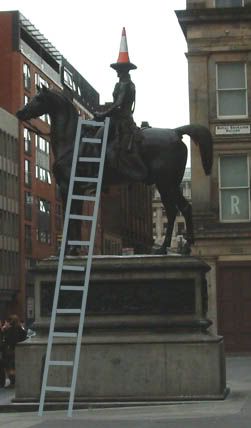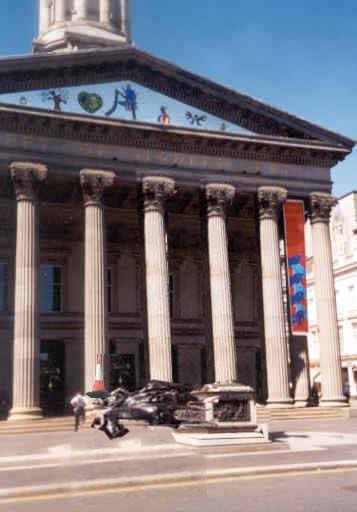Page 2 of 4

Posted:
Thu Jan 27, 2005 7:06 pmby duncan

Posted:
Thu Jan 27, 2005 7:42 pmby DMcNay
The Battle of Waterloo was a HUGE deal back then.
I even live a stones throw from the village of Waterloo, named after the battle.

Posted:
Fri Jan 28, 2005 12:34 pmby Bruce
The statue is not commemorating the battle of Waterloo, nor is it a memorial to local regiments who fought in the battle, it's a memorial to the "Iron Duke" who as far as I'm aware had nothing to do with Glasgow.
I'm not saying it should be torn down or anything, i just don't see what's wrong about putting a cone on his head (even if this results in a bit of damage) - Unless we are meant to be respecting the statue as a work of art?
With regard to it's value as a work of art - I note that on the Glasgow Guide it says the statue was erected in 1884
http://www.glasgowguide.co.uk/gpages/glasgow-wellington1z.html - but Carlo Marochetti died in 1868
http://www.speel.demon.co.uk/artists2/maroch.htm - So I'm guessing it's just a copy?

Posted:
Fri Jan 28, 2005 1:22 pmby DMcNay
Bruce wrote:The statue is not commemorating the battle of Waterloo, nor is it a memorial to local regiments who fought in the battle, it's a memorial to the "Iron Duke" who as far as I'm aware had nothing to do with Glasgow.
No, but Waterloo was a big deal and so it was probably decided to erect a statue to the man who masterminded the victory, seeing as he was the obvious symbol to put in statue form.
Not sure of the dates. Wellesley died in 1852, after the sculptor and you say this was erected in 1884. God knows. Maybe for the 70th Anniversary of the battle? Not a particularly noteworthy anniversary, like the 50th or 100th, and anyway it was a year early, given that Waterloo was 1815.

Posted:
Fri Jan 28, 2005 1:43 pmby crusty_bint
Perhaps it was erected for an impending Royal visit? Incidently, the statue of Victoria in George Sq was the first equestrian sttue of her ever comissioned. Also, bear in mind that as "Second City of the Empire" Glasgow would have to be seen to being into a fashionable hero worship, and ego building. There was a few Wellington Streets around, certainly there was one in the Gorbals until it was annexed by Glasgow and the name changed to Ballater St/Pl. Another interestig little fact is that the Nelson Monument on the Green (the obleisk) was the first monument erected to his memory, although it does pre-date the Glasgows Imperial Provenance.
Crusty

Posted:
Fri Jan 28, 2005 1:44 pmby Closet Classicist
Think the date is wrong Bruce. Just checked Ray Mackenzie's book Public Sculpture of Glasgow and it has it down as being erected in 1844 having been commisioned in 1840. How do those dates tally with Wellington's life?

Posted:
Fri Jan 28, 2005 1:51 pmby Bruce
Ahhh - that explains it.
Must just have been a typo on the Glasgow Guide site.
The duke would still have been alive in 1844. Somehow you can't imagine them erecting a statue to a living war leader and / or politician these days.
What about a statue to Maggie - after all she did lead us to Victory in the Falklands?

Posted:
Fri Jan 28, 2005 3:04 pmby DMcNay
Closet Classicist wrote:Think the date is wrong Bruce. Just checked Ray Mackenzie's book Public Sculpture of Glasgow and it has it down as being erected in 1844 having been commisioned in 1840. How do those dates tally with Wellington's life?
In 1840....35 years after Waterloo, 10 years after he had been Prime Minister, 6 years before he retired from public life, and twelve years before he died.
I have no idea. Maybe someone thought a statue was a good idea.
The legendary William Topaz McGonagall obviously thought so, and wrote:
Then there's the Duke of Wellington's statue in Royal Exchange Square
It is a beautiful statue I without fear declare,
Besides inspiring and most magnificent to view,
Because he made the French fly at the battle of Waterloo.

Posted:
Fri Jan 28, 2005 4:20 pmby Closet Classicist
There is a great deal about it in Ray Mackenzies book. The proposal did cause a flurry of debate and letters to the Herald. Must have been something people felt strongly about as it was the fastest raised amount of money by private subscription for a public sculpture in Glasgow. But why here why now (if you get my drift)? What would the motivate such strong sentiments? It is not as if Wellington had a local connection.

Posted:
Thu Feb 17, 2005 10:15 amby Sharon
Well, as this piece points out, the cones do help to keep the pigeon shit of the statue....
http://news.bbc.co.uk/2/hi/uk_news/scotland/4264683.stm

Posted:
Thu Feb 17, 2005 11:51 amby escotregen
The question of why build the statue when it was built does have some intrigue to it. In the 1840s he was out of Government office and out of favour. However, I think, he was still highly regraded in popular Tory circles. Moreover, Glasgow was in the 19th century a
strongly 'conservative' domain. (The great period of Glasgow was arguably as a bourgeois city and the 'Red Clydeside' myth came alongside decline).
He did also have consistently long links with Scotland at least, if not especially Glasgow. For example he was president or patron or something of the 'The Highland Society in London' and the 'Society for propagating Christian knowledge in the Highlands and Islands' (Catholics presumably not counting as Christian then?).
The 1840s also saw the ermergence of a Tory (and even Liberal) element of Scottish society that in the post-union period was always desperate to seal 'Scottish' identity within the 'British' identity; as with Walter Scott. Adulation of iconic figures like Wellington would be instrumental in this - and usefully, Wellington was Irish born and therefore more appropriate as an iconic figure for the Scoto/British perspective.
Also, taking a guess - 40 year anniversary of Waterloo? - just maybe the subscription effort began in anticipation of having the statute ready for the anniversary year? After all the Scottish squares were critical to the victory at Waterloo, and the British Scottish regiments were with him for most of his campaigning (something Montgomery learned from him).
And by the way, I have written to the editor of the 'Economist' about their introduction to a new book on the Battle of Waterloo being described as "for some possibly England's finest fighting moment... err jist a minute Jimmy, what about the Scottish Squares stand against Ney's desperate calvary charge that saved Wellington's centre... and didn't the British State and the British army exist for over a hundred years before the battle? However, I digress.

Posted:
Thu Feb 17, 2005 2:06 pmby DMcNay
You digress but make a very valid point. Scotland too often gets ignored in terms of history.
Pick any military victory in the last two hundred years, and you'll find the Scots were there, right down to having (I believe) the highest casualty rate proportional to the countries population than any other allied country in the First World War.
And yet some forums I'm on would have you convinced that it was all to do with the English regiments. Aye. Pish.

Posted:
Thu Feb 17, 2005 5:38 pmby Closet Classicist
Thanks for that escotregen. Most illuminating. You might not believe this coming from me but I was never allowed to do history at school after 'O' grade. The timetable wouldn't permit it. History, biology, and art were my favorite subjects and alas they don't tend to go together so I was forced to choose between them (I think I was regarded as a complete odd ball)and I've never forgiven the school for that. Consequently history is forbidden fruit for me and I lap it up.
Good luck in taking on the Economist. Typical the world stops at the Watford gap point of view. They should really know better.

Posted:
Thu Feb 17, 2005 8:08 pmby Bruce
OK - I grudgingly admit that perhaps the statue is of some historical and artistic importance, and that the council probably have to do something to prevent further damage to the statue. (& also there's the whole health & safety aspect of people climbing on it)
But what about a bit of lateral thinking.
Instead of all this negative talk about deterrence etc -
Why doesn't the council for once just respond to the needs of its citizen and do a bit of facilitating . . .
 Please note the ladder has been specially positioned to allow safe & easy access for the placing of the cone on either the duke head, or that of his horse. I accept that the design of the ladder could perhaps be developed (to make is slightly more aesthetically pleasing) but I think the basic principle is pretty sound.
Please note the ladder has been specially positioned to allow safe & easy access for the placing of the cone on either the duke head, or that of his horse. I accept that the design of the ladder could perhaps be developed (to make is slightly more aesthetically pleasing) but I think the basic principle is pretty sound.
The only problem I can see is that of disabled access (what with the DDA regs etc). If Mohamed won’t (or can’t) go to the mountain, I suppose the mountain will have to come to Mohamed - perhaps the statue could be re-orientated into a more horizontal arrangement?

Apologies to the maker of Photoshop for my very poor use of their excellent product.

Posted:
Thu Feb 17, 2005 9:09 pmby Sharon
hahahha brilliant!
Photoshop is proving its worth once more





